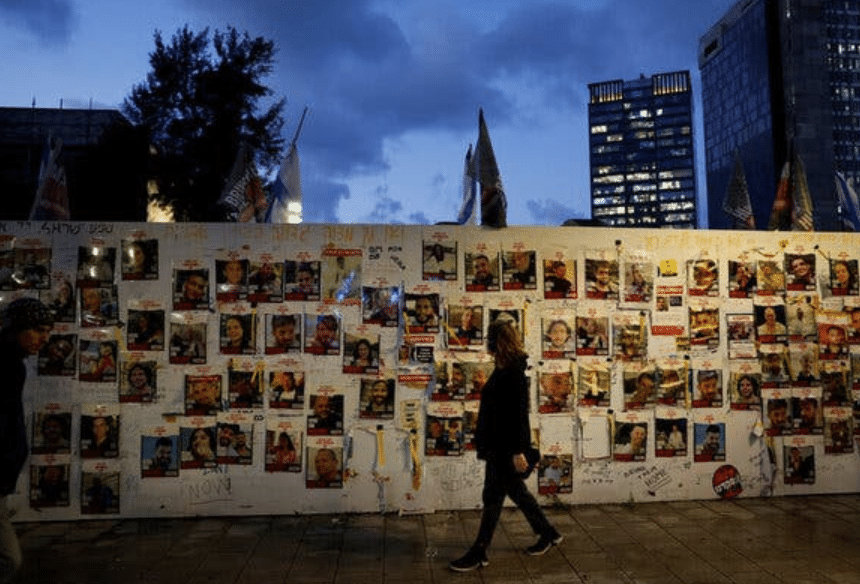Israel has called securing the freedom of the hostages abducted to Gaza a key goal in its war against Hamas, so many in the country were shocked on Tuesday when it emerged that at least a fifth of the captives were already dead.
The news was likely to worsen a furor in Israel, where a debate over the government’s course of action in Gaza regarding the hostages has become divisive.
Israeli intelligence officers have concluded that at least 30 of the remaining 136 hostages captured by Hamas and its allies on Oct. 7 have died since the start of the war, according to a confidential assessment that was reviewed by The New York Times.
The bodies of two other dead Israelis, killed in 2014 during a previous war between Israel and Hamas, have been held in the territory ever since, bringing the total number of slain hostages inside Gaza to at least 32.
The Israeli government late on Tuesday released a statement saying that only 31 had been confirmed dead; the discrepancy between the two numbers could not be immediately reconciled.
“We have informed 31 families that their captured loved ones are no longer among the living and that we have pronounced them dead,” Rear Adm. Daniel Hagari, the military’s chief spokesman, said Tuesday after The Times published a report about the previously undisclosed hostage deaths.
Four officials said that Israeli intelligence officers were also assessing unconfirmed information that indicated that at least 20 other hostages may have also been killed.
[The New York Times Report continues].
More than 240 hostages were captured by Hamas and its allies during the Oct. 7 raid on southern Israel, prompting Israel to retaliate with massive airstrikes and then a ground invasion. Roughly half of the hostages have been freed, almost all during a temporary truce in November, when they were exchanged for 240 Palestinian prisoners and detainees held in Israeli jails.
Since that truce, the Israeli government has said that its military operations in Gaza would pave the way to further hostage releases. Officials have argued that every Israeli military success places Hamas under more pressure to negotiate another exchange, and makes the military better able to rescue the remaining captives by force.
But scores of survivors and families of the hostages have said that the military campaign is endangering their loved ones’ lives. They want the government to make it a priority to reach a new hostage deal instead of pressing ahead with the invasion, lest their relatives be killed in the crossfire. Only one hostage has been freed by an Israeli military rescue operation.
The debate over the hostages has become particularly acute in recent days, as negotiations over another cease-fire deal — mediated by Egypt and Qatar — have gathered momentum.
[The New York Times Report continues]
Asked for comment, the Israeli military said in a statement that it was “deploying all available resources to locate and retrieve as much information as possible regarding the hostages currently held by Hamas.”
A spokeswoman for the main alliance of hostage families, Liat Bell Sommer, said the alliance was seeking an immediate deal.
“We are aware that there are bodies in Hamas captivity. We are also aware that every day the hostages are held in Hamas tunnels is a death sentence to them,” Ms. Sommer said.
Other hostages may have also already died, but the military has yet to declare them dead because it needs to attain absolute proof before telling their families, according to Avi Kalo, who led a military intelligence department that dealt with prisoners of war and missing people.
“When it comes to the decision about whether to declare a prisoner of war, or a missing person, dead, Israeli intelligence needs 100 percent certainty,” said Mr. Kalo.
“Such a terrible message must not be conveyed except in the case of absolute and final knowledge,” he added.
The Israeli military’s assessment did not conclude that any of the dead hostages were killed in Israeli strikes. But some of the hostages freed in November have said that they fear those still in Gaza could be killed in Israeli salvos. At least one freed hostage said the relentless Israeli bombardment at times felt as menacing as the threat posed by her captors.
“Many times I told myself that, in the end, I will die from Israel’s missiles and not from Hamas,” said Sahar Kalderon, speaking in an interview last December, weeks after being released. Her father remains captured inside Gaza.
“What about my father, who has been left behind?” she said in the interview. “I ask of everyone who sees this: Please, stop this war; get all the hostages out.”
Reporting was contributed by Johnatan Reiss, Aaron Boxerman, Gabby Sobelman and Rawan Sheikh Ahmad.
Ronen Bergman is a staff writer for The New York Times Magazine, based in Tel Aviv. His latest book is “Rise and Kill First: The Secret History of Israel’s Targeted Assassinations,” published by Random House. More about Ronen Bergman
Patrick Kingsley is the Jerusalem bureau chief, covering Israel and the occupied territories. He has reported from more than 40 countries, written two books and previously covered migration and the Middle East for The Guardian. More about Patrick Kingsley
View this New York Times Article from February 6th

